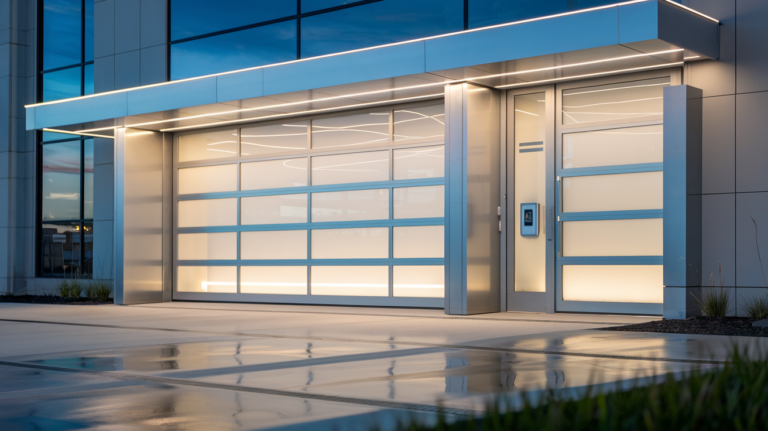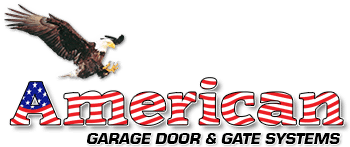
Selecting the right commercial garage door is a big decision. It impacts your daily operations, security, and even your business’s energy costs. Whether upgrading an existing system or outfitting a new facility, understanding your options ensures you make a choice that serves your business well for years.
With a wide array of materials, styles, and technological features available, the process can seem overwhelming. However, by focusing on your specific operational needs and long-term goals, you can select a commercial garage door that enhances your business operations’ functionality and efficiency.
Types of Commercial Garage Doors
Commercial garage doors have evolved far beyond essential rolling shutters. Today’s options combine advanced materials with sophisticated operating systems to meet diverse business needs. The key is matching the door type to specific operational requirements.
Rolling Steel Doors
Rolling steel doors are popular for commercial buildings due to their durability and security features. They are constructed from high-quality galvanized steel and offer superior protection against theft and harsh weather conditions. They are designed to roll up into a compact coil, making them ideal for spaces with limited overhead clearance. Some other things they add are:
- Ideal for high-security needs
- Minimal overhead space requirements
- Excellent for large openings
- Multiple gauges available
Sectional Doors
Sectional doors offer versatility and are well-suited for a variety of commercial applications. They seamlessly blend functionality with aesthetic appeal, making them an excellent choice for businesses looking to enhance security and energy efficiency. Some key features include:
- Traditional raised panel design
- Various window configurations
- Insulation options
- Smooth operation
Specialty Options
When it comes to specialized needs, commercial garage doors offer a range of options designed to meet unique operational requirements. These specialty doors provide safety, speed, and environmental control solutions, ensuring your business remains efficient and secure. Below are some specialty options to find the perfect fit for your specific needs:
- Fire-rated doors for safety compliance
- High-speed doors for frequent access
- Impact-resistant hurricane doors
- Cold storage doors
Modern commercial doors often allow customization beyond these standard categories. Working with commercial door specialists helps identify hybrid solutions that better serve the unique operational needs of industrial customers.
Essential Features for Business Operations
Security and performance form the foundation of any commercial door system. Modern doors offer sophisticated security features while maintaining smooth operation for daily use. The right combination of features protects your assets while supporting efficient workflows.
Critical security elements include:
- Physical Security
- Multi-point locking systems
- Reinforced frames and tracks
- Anti-lift mechanisms
- Impact resistance ratings
- Access Control
- Keypad entry systems
- Card readers
- Biometric scanners
- Remote monitoring
Performance requirements vary by industry, but certain specifications always matter:
- Operational Standards
- Minimum cycle ratings
- Opening and closing speeds
- Wind load resistance
- Sound reduction capabilities
- Maintenance intervals
While security and performance features may seem overwhelming, prioritizing based on your specific operation helps narrow the choices. Focus first on non-negotiable requirements for your industry, then consider additional features that could enhance efficiency.
Industry-Specific Considerations
Different industries require specialized door features to operate effectively. A retail storefront has different needs than a cold storage facility or automotive service center.
Retail and Storefront Operations
Retail and storefront operations thrive on visual appeal and customer engagement, making commercial doors a critical aspect of their business strategy. The right door enhances curb appeal and integrates seamlessly with brand aesthetics. Key considerations include:
- Clean, modern designs
- Custom color options
- Glass and aluminum options
- Brand integration possibilities
- Curb appeal focus
In addition to aesthetics, energy efficiency, fire protection, and security are paramount, ensuring the door contributes to a welcoming yet safe shopping environment.
Warehouse Facilities
Warehouse facilities prioritize functionality and efficiency in their door selection, as these elements are crucial for smooth operations. Doors must accommodate the high demands of logistics and storage while ensuring robust security. Essential factors to consider are:
- Dock height compatibility
- Rapid opening speeds
- Heavy-duty construction
- Maximum clearance width
- Seal integrity
By focusing on these practical elements, warehouse facilities can enhance their operational efficiency, ultimately increasing productivity and reducing downtime.
Smart Technology and Access Control
Modern commercial doors incorporate sophisticated technology that enhances security while simplifying operations. These innovative features can integrate with existing building management systems for streamlined control.
- Automation Features
- Smartphone control capabilities: Easily manage door operations remotely using a mobile app.
- Schedule-based operation: Set specific times for doors to open or close automatically.
- Traffic pattern monitoring: Analyze door usage to optimize access and improve efficiency.
- Maintenance alerts: Receive notifications for routine maintenance to ensure door longevity.
- Security event logging: Track and record access events for enhanced security management.
- Climate response systems: Adjust door settings based on environmental conditions to maintain comfort and efficiency.
These advanced features can significantly improve operational efficiency while providing the business owner unprecedented control over access and security. However, choosing a system that balances sophisticated features with user-friendly operation is essential. While advanced technology offers impressive capabilities, the key is selecting features that genuinely benefit your operation rather than adding complexity. Start with core functionalities and expand as your needs evolve.
Material Selection and Durability
Material choice affects everything from security to maintenance requirements. Understanding material properties helps match door construction to specific business needs.
When selecting the material for your commercial garage door, it’s essential to consider the specific needs of your business. Each material offers unique benefits:
- Steel Construction: Known for its strength and durability.
- Multiple gauge options: Offers flexibility in thickness and strength.
- Galvanized or stainless steel: Provides rust resistance and longevity.
- Insulated panel designs: Enhances energy efficiency and temperature control.
- Aluminum and Glass: Perfect for businesses prioritizing aesthetics and natural light.
- Full-view capabilities: Allows maximum visibility and light transmission.
- Light transmission: Brightens interior spaces with natural light.
- Modern aesthetic appeal: Complements contemporary architectural styles.
- Advanced Materials: Ideal for specialized requirements and enhanced performance.
- Composite options: Combines materials for improved durability.
- Polycarbonate panels: Offers impact resistance and lightweight properties.
- High-impact materials: Designed to withstand harsh conditions and heavy use.
The initial material choice affects every aspect of door performance and longevity. Consider not just today’s needs but how your business or market might evolve over the next decade when selecting materials.
Energy Efficiency and Climate Control
Energy efficiency has become increasingly important for businesses looking to control operating costs. Modern industrial and commercial doors offer impressive insulation options that help maintain consistent interior temperatures while reducing HVAC loads.
Key efficiency features:
- Thermal Barriers
Thermal barriers are essential in preventing heat transfer between indoor and outdoor environments. By incorporating advanced materials, these barriers help maintain a stable internal climate, reducing the need for excessive heating or cooling. - Panel Insulation Ratings
High panel insulation ratings ensure that the door effectively minimizes energy loss. These ratings provide a measure of the door’s ability to resist heat flow, contributing to lower energy consumption and enhanced indoor comfort. - Thermal Breaks
Thermal breaks are integrated into door frames to interrupt the thermal conductivity between the exterior and interior. This feature is crucial in preventing heat loss and minimizing energy expenditure, especially in extreme climates. - Weather Sealing Systems
Weather sealing systems protect against drafts and air leaks, ensuring the interior remains unaffected by external weather conditions. These seals are vital for maintaining energy efficiency and preventing unwanted temperature fluctuations. - Air Infiltration Prevention
By minimizing air infiltration, commercial doors help maintain a consistent indoor climate. This feature reduces the strain on HVAC systems, leading to significant energy savings and improved operational efficiency. - Edge Seal Technology
Edge seal technology enhances the door’s ability to create a tight seal when closed. This prevents air leakage around the door’s edges, contributing to energy conservation and maintaining a comfortable indoor environment. - Climate Zone Compliance
Climate zone compliance ensures the commercial door meets specific regional energy efficiency standards. This compliance guarantees that the door is optimized for the local climate, promoting energy savings and environmental sustainability.
Energy efficiency features often pay for themselves through reduced utility costs and improved climate control. Consider this an investment in both environmental responsibility and long-term operational savings.
Making the Final Decision
Choosing the right commercial garage door is a crucial investment in your business’s infrastructure, influencing initial costs and long-term value. Key considerations include understanding installation requirements, which vary by door type and architectural features, ensuring smooth and efficient operation. Regular maintenance is vital for optimal performance and longevity, preventing costly repairs and meeting business demands. Evaluate warranty coverage for peace of mind, as it can cover unexpected repairs and reduce long-term expenses. Additionally, consider the door’s upgrade potential to adapt to evolving business needs without a complete replacement.
Energy efficiency and security are critical; a well-insulated door can lead to significant energy savings, while advanced security features protect assets. Climate considerations are also essential, as the door must withstand extreme weather or provide superior insulation. Professional consultation is invaluable for navigating these decisions, offering tailored solutions that align with current and future business needs. For a comprehensive evaluation and expert guidance on selecting the perfect solution, contact us to ensure your investment supports your business’s success for years.
Recent Posts
Archives
- December 2024
- November 2024
- October 2024
- September 2024
- August 2024
- July 2024
- June 2024
- May 2024
- March 2024
- February 2024
- December 2023
- November 2023
- October 2023
- September 2023
- August 2023
- July 2023
- May 2023
- April 2023
- March 2023
- January 2023
- December 2022
- October 2022
- September 2022
- August 2022
- July 2022
- June 2022
- April 2022
- March 2022
- February 2022
- January 2022
- December 2021
- November 2021
- October 2021
- September 2021
- August 2021
- July 2021
- June 2021
- May 2021
- April 2021
- March 2021
- February 2021
- January 2021
- December 2020
- November 2020
- October 2020
- September 2020
- August 2020
- September 2017
- August 2017
- July 2017
- June 2017
- May 2017
- February 2017
- January 2017
- December 2016
- November 2016
- October 2016
- September 2016
- July 2016
- June 2016
- May 2016
- April 2016
- January 2014
- November 2013
- September 2013
- March 2013
- February 2013
- January 2013
- December 2012
- November 2012
- October 2012
- September 2012

Recent Comments